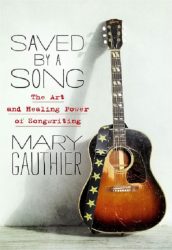 Mary Gauthier’s ‘Saved By A Song‘ is subtitled ‘The Art and Healing Power of Songwriting‘ and consists of, it should surprise no-one, powerful stories associated with particular songs of hers – stories about what the songs are trying to say, stories of how the songs reflect on the life of Mary Gauthier, and stories of how these songs have impacted on others. It should be no surprise, because what Mary Gauthier has proven time and again is that she is a masterful storyteller – and that her songs illustrate aspects of the lives of some of her listeners. God knows one wouldn’t want to have lived every story she relates, but there’s often something observed which rings true to one’s own experience. As she say early on in ‘Saved By A Song‘ her aim for herself in writing songs is to “sort out confusion, untangle powerful emotions, and ward off desperation. It helps me navigate the powerful emotional weather systems of life.” Although there are some early words addressing Gauthier’s songwriting teaching – she has run folk festival songwriting workshops, and has over the years worked with writers approaching the art as a profession and those who just really want to find a way to say something that matters to them in a way that makes sense to others – the book is definitely not a “how to guide“. It is an attempt to explain how songs can evolve, show themselves as incomplete, and finally take on the meaning that the songwriter (Gauthier in this case) wants to convey.
Mary Gauthier’s ‘Saved By A Song‘ is subtitled ‘The Art and Healing Power of Songwriting‘ and consists of, it should surprise no-one, powerful stories associated with particular songs of hers – stories about what the songs are trying to say, stories of how the songs reflect on the life of Mary Gauthier, and stories of how these songs have impacted on others. It should be no surprise, because what Mary Gauthier has proven time and again is that she is a masterful storyteller – and that her songs illustrate aspects of the lives of some of her listeners. God knows one wouldn’t want to have lived every story she relates, but there’s often something observed which rings true to one’s own experience. As she say early on in ‘Saved By A Song‘ her aim for herself in writing songs is to “sort out confusion, untangle powerful emotions, and ward off desperation. It helps me navigate the powerful emotional weather systems of life.” Although there are some early words addressing Gauthier’s songwriting teaching – she has run folk festival songwriting workshops, and has over the years worked with writers approaching the art as a profession and those who just really want to find a way to say something that matters to them in a way that makes sense to others – the book is definitely not a “how to guide“. It is an attempt to explain how songs can evolve, show themselves as incomplete, and finally take on the meaning that the songwriter (Gauthier in this case) wants to convey.
‘Saved By A Song‘ is broken down into thirteen chapters each attached to a single song – such as ‘I Drink,’ ‘Drag Queens in Limousines,’ and ‘Mercy Now‘ – and the story of the song is typically a careful interweaving of different strands which ultimately led to the song being completed. Take ‘I Drink‘ – the background in Mary Gauthier’s own drinking, and her final quitting of alcohol and drugs at the age of 28 is key of course, but there’s also the story of Gauthier becoming a singer, her first tentative and less than successful attempts at performing at Open Mics. And the story of how attending an Indigo Girls’ gig opened her eyes to her own need to create music. And that links in to her teenage realisation of her sexuality and the way that affected her. And then there’s the song itself – a mixture of truth in the memories of her father and an imagined future that would have come to “a Mary who had not gotten sober and was stuck in a rundown apartment.” She describes a process of boiling the song down to its core, with the assistance of Crit Harmon, wearing it down over a period of two years until the final version we know and admire. It’s all told in a conversational tone, anecdotes crossing across each other until the final realisation of what they all mean to the song being developed. It makes for a very easy and engaging read, and in several of the chapters the real meaning behind the songs being discussed can be very different from the surface interpretation it’s easy for one to identify.
It’d be wrong to reveal the details associated with each song – suffice to say that Gauthier reveals a lot about herself and her approach to songwriting – and how the crafting emotional and engaging songs has been of benefit to herself in being able to better understand the world, her place in it and her own actions and motivations. Music as a kind of therapy – well the ‘Rifles and Rosary Beads‘ project and album was already more than a hint at that, and the chapter dealing with that is notably moving as it depicts the ability of music to heal – sometimes a song is just a song and sometimes it means a whole lot more than that. This is a book that should appeal to anyone who already admires Mary Gauthier’s music, but it’s also of interest to anyone who wants to understand the difference between “moon-spoon-June” and more meaningful songs that, more or less, demand to be written.


